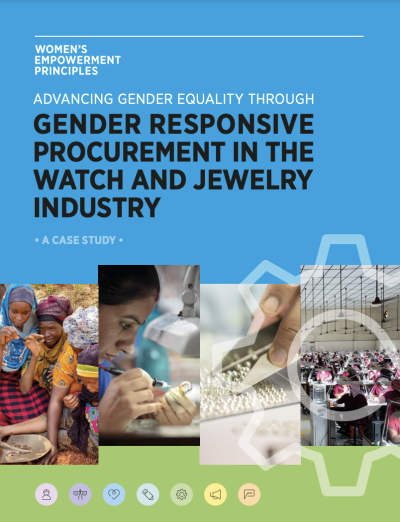
- Report year:2024
- Report author: This case study was prepared by Anna Falth and Mihwa Park at the WEPs Secretariat at UN Women with support of Iris Van der Veken and Emilie Van Landeghem from the Watch & Jewellery Initiative 2030 (WJI 2030).
- Organisation: Women's Empowerment Principles
The lack of women’s representation at decision making tables threatens to sideline gender equality as a top-level concern. Paradoxically, women wield significant influence in shaping family consumer choices, including the watch and jewelry industry. In 2009, they steered around $20 trillion in annual consumer spending, and it is estimated that by 2028, women will own 75 per cent of discretionary spend. The jewelry industry exemplifies this trend, with women driving over 90 per cent of jewelry demand. Nevertheless, the industry’s leadership remains predominantly male-dominated.
Encouragingly, there is a growing recognition within the industry of the imperative to advance gender equality and women’s empowerment. Key industry players are actively working to bridge the gender gaps and create opportunities for women across their value chains, from mining to retail. By acknowledging these disparities and collectively advancing gender equality, the industry paves the way for a more just and inclusive future.
In 2023, UN Women introduced the WEPs Gender-Responsive Procurement Assessment Tool (the Tool) to help companies gauge their progress on GRP policies and practices. This Tool – made up of 31 questions – identifies gaps and areas for improvement. To test this Tool, UN Women partnered with the Watch & Jewellery Initiative 2030 (WJI 2030) to launch a pilot programme that evaluates gender responsive procurement in the jewelry industry.
Read this report to learn more about the findings of this pilot.
Encouragingly, there is a growing recognition within the industry of the imperative to advance gender equality and women’s empowerment. Key industry players are actively working to bridge the gender gaps and create opportunities for women across their value chains, from mining to retail. By acknowledging these disparities and collectively advancing gender equality, the industry paves the way for a more just and inclusive future.
In 2023, UN Women introduced the WEPs Gender-Responsive Procurement Assessment Tool (the Tool) to help companies gauge their progress on GRP policies and practices. This Tool – made up of 31 questions – identifies gaps and areas for improvement. To test this Tool, UN Women partnered with the Watch & Jewellery Initiative 2030 (WJI 2030) to launch a pilot programme that evaluates gender responsive procurement in the jewelry industry.
Read this report to learn more about the findings of this pilot.
